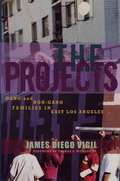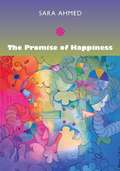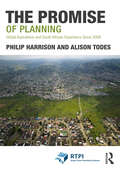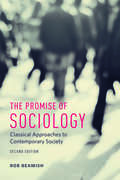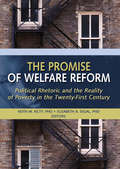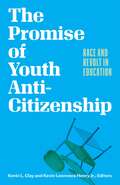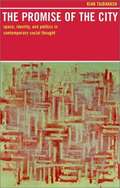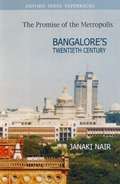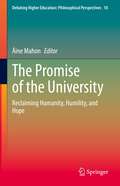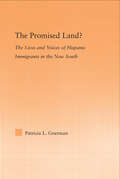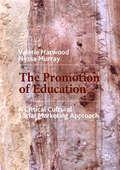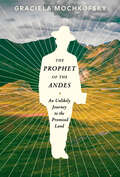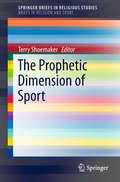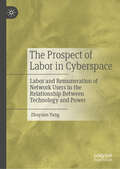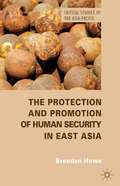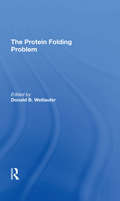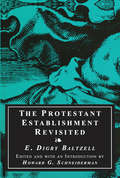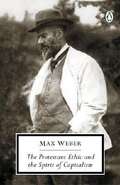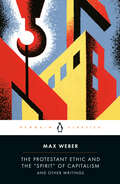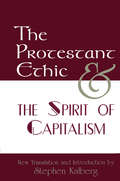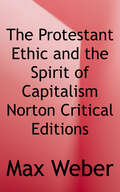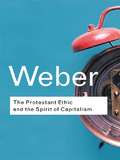- Table View
- List View
The Projects
by James Diego VigilThe Pico Gardens housing development in East Los Angeles has a high percentage of resident families with a history of persistent poverty, gang involvement, and crime. In some families, members of three generations have belonged to gangs. Many other Pico Gardens families, however, have managed to avoid the cycle of gang involvement. In this work, Vigil adds to the tradition of poverty research and elaborates on the association of family dynamics and gang membership. The main objective of his research was to discover what factors make some families more vulnerable to gang membership, and why gang resistance was evidenced in similarly situated non-gang-involved families. Providing rich, in-depth interviews and observations, Vigil examines the wide variations in income and social capital that exist among the ostensibly poor, mostly Mexican American residents. Vigil documents how families connect and interact with social agencies in greater East Los Angeles to help chart the routines and rhythms of the lives of public housing residents. He presents family life histories to augment and provide texture to the quantitative information. By studying life in Pico Gardens, Vigil feels we can better understand how human agency interacts with structural factors to produce the reality that families living in all public housing developments must contend with daily.
The Promise of Happiness
by Sara AhmedThe Promise of Happiness is a provocative cultural critique of the imperative to be happy. It asks what follows when we make our desires and even our own happiness conditional on the happiness of others: "I just want you to be happy"; "I'm happy if you're happy. " Combining philosophy and feminist cultural studies, Sara Ahmed reveals the affective and moral work performed by the "happiness duty," the expectation that we will be made happy by taking part in that which is deemed good, and that by being happy ourselves, we will make others happy. Ahmed maintains that happiness is a promise that directs us toward certain life choices and away from others. Happiness is promised to those willing to live their lives in the right way. Ahmed draws on the intellectual history of happiness, from classical accounts of ethics as the good life, through seventeenth-century writings on affect and the passions, eighteenth-century debates on virtue and education, and nineteenth-century utilitarianism. She engages with feminist, antiracist, and queer critics who have shown how happiness is used to justify social oppression, and how challenging oppression causes unhappiness. Reading novels and films including Mrs. Dalloway, The Well of Loneliness, Bend It Like Beckham, and Children of Men, Ahmed considers the plight of the figures who challenge and are challenged by the attribution of happiness to particular objects or social ideals: the feminist killjoy, the unhappy queer, the angry black woman, and the melancholic migrant. Through her readings she raises critical questions about the moral order imposed by the injunction to be happy.
The Promise of Planning: Global Aspirations and South African Experience Since 2008 (ISSN)
by Alison Todes Philip HarrisonThe Promise of Planning explores the experience of planning internationally since the global financial crisis, focusing on South Africa. The book is a response to a decade-plus in which state-led planning has re-emerged as a putative means for achieving developmental goals (as indicated in global initiatives such as the New Urban Agenda) and where planning in South Africa has consolidated in terms of its legal and policy basis. However, the return of planning is happening in an inauspicious context, with economic fragilities, technological shifts, political populism, institutional complexities, and more, threatening to upturn the "new promise of planning." The book provides a careful analytical account of planning in South Africa and how and why its promises have been difficult to achieve. Building on the authors’ previous book, Planning and Transformation, the book sheds light on planning as an increasingly complex and diverse governmental practice within a perpetually changing world. It can be used as a resource for planners who must make good on the new promise of planning while navigating the risks and threats of the contemporary world, as well as students and faculty interested in international planning debates and the South African case.
The Promise of Sociology: Classical Approaches to Contemporary Society, Second Edition
by Rob BeamishUnlike most introductory texts that take a topical approach to studying sociology, this smart, challenging, and accessibly written text looks at the core principles of the discipline, making links to a contemporary context. The second edition of this award-winning book has been substantially revised, making more direct connections between Generation Z, Mills’s concept of the sociological imagination, and the challenges students face in higher education today. The section on popular culture contains a new chapter on the history of popular music from early rock ’n’ roll to contemporary pop and R&B. New chapter objectives, end-of-chapter review and reflection questions, key terms, and glossary, as well as an instructor’s manual, make this text much more useful in the classroom.
The Promise of Welfare Reform: Political Rhetoric and the Reality of Poverty in the Twenty-First Century
by Elizabeth SegalFind out how-and why-legislation has made economic rights more important than human rightsSince 1996, politicians and public officials in the United States have celebrated the "success" of welfare reform legislation despite little, if any, evidence to support their claims. The Promise of Welfare Reform: Political
The Promise of Youth Anti-Citizenship: Race and Revolt in Education
by Kevin L. Clay Kevin Lawrence Henry Jr.When inclusion into the fold of citizenship is conditioned by a social group&’s conceit to ritual violence, humiliation, and exploitation, what can anti-citizenship offer us? The Promise of Youth Anti-citizenship argues that Black youth and youth of color have been cast as anti-citizens, disenfranchised from the social, political, and economic mainstream of American life. Instead of asking youth to conform to a larger societal structure undergirded by racial capitalism and antiblackness, the volume&’s contributors propose that the collective practice of anti-citizenship opens up a liberatory space for youth to challenge the social order. The chapters cover an array of topics, including Black youth in the charter school experiment in post-Katrina New Orleans; racial capitalism, the queering of ethnicity, and the 1980s Salvadoran migration to South Central Los Angeles; the notion of decolonizing classrooms through Palestinian liberation narratives; and more. Through a range of methodological approaches and conceptual interventions, this collection illuminates how youth negotiate and exercise anti-citizenship as forms of either resistance or refusal in response to coercive patriotism, cultural imperialism, and predatory capitalism. Contributors: Karlyn Adams-Wiggins, Portland State U; Ariana Brazier; Julio Cammarota, U of Arizona; Michael Davis, U of Wisconsin–Madison; Damaris C. Dunn, U of Georgia; Diana Gamez, U of California, Irvine; Rachel F. Gómez, Virginia Commonwealth U; Luma Hasan; Gabriel Rodriguez, Iowa State U; Christopher R. Rogers, U of Pennsylvania; Damien M. Sojoyner, U of California, Irvine.
The Promise of the City: Space, Identity and Politics in Contemporary Social Thought
by Kian TajbakhshUsing three core ideas--the hybridity of identities, multilayered spaces and the porousness of borders, and the structural contradiction between community and market/state system, this critical urban social theory argues that the complex experiences in cities still contribute to the deepening of radical democracy in a multicultural society.
The Promise of the Metropolis: Bangalore's Twentieth Century
by Janaki NairThe volume provides a comprehensive perspective on the city of Bangalore that relates to three levels of analysis, that of the conceived city, the perceived city and spatial practice.
The Promise of the University: Reclaiming Humanity, Humility, and Hope (Debating Higher Education: Philosophical Perspectives #10)
by Áine MahonThis book offers philosophical readings of the contemporary university and is motivated by a series of pressing challenges in the global context of Higher Education. It argues that the university is a place for community, for refuge, for enlightenment and the careful questioning of knowledge, but it is also a place for visceral ambition and for intellectual cowardice, for blinkered individualism and professional competitiveness. In the context of a highly competitive post-crash global economy, contemporary students are placed under increasing pressure to distinguish themselves from their peers via a portfolio of learning excellence and extracurricular achievement. Growing numbers undertake part or full-time employment in order to cover registration fees and the basic costs of living. University staff take on very different forms of pressure that operate across the life-course of an academic career – from early-career anxieties to the worries of more privileged and permanent faculty who fear they do not meet ever-changing structures, assumptions and demands of the university itself. This book argues that these interlinked agendas demand consideration from philosophers of education in Ireland, Europe and further afield. It proposes that we must embody a very careful balancing act: one where we remember the romantic ideals and promises of the university while still acknowledging the very real and pressing challenges faced by our staff and students. The book will be of interest to academics, graduate students, and advanced-level undergraduates in Philosophy, Education, Mental Health, and Organizational Psychology in both North America and Europe.
The Promised Land
by Boulou De B'Beri Handel K. Wright Nina Reid-MaroneyEschewing the often romanticized Underground Railroad narrative that portrays southern Ontario as the welcoming destination of Blacks fleeing from slavery, The Promised Land reveals the Chatham-Kent area as a crucial settlement site for an early Black presence in Canada. The contributors present the everyday lives and professional activities of individuals and families in these communities and highlight early cross-border activism to end slavery in the United States and to promote civil rights in the United States and Canada. Essays also reflect on the frequent intermingling of local Black, White, and First Nations people. Using a cultural studies framework for their collective investigations, the authors trace physical and intellectual trajectories of Blackness that have radiated from southern Ontario to other parts of Canada, the United States, the Caribbean, and Africa. The result is a collection that represents the presence and diffusion of Blackness and inventively challenges the grand narrative of history.
The Promised Land?: The Lives and Voices of Hispanic Immigrants in the New South (Latino Communities: Emerging Voices - Political, Social, Cultural and Legal Issues)
by Patricia L. GoermanThrough analysis of in-depth interviews with seventy-three Hispanic immigrants in Central Virginia, this book offers a rare in-depth look at the views and circumstances of immigrants in a new receiving area. It provides an examination of the new migration trend including an analysis of immigrants' living and working conditions, their family life, and their plans for the future.
The Promotion of Education: A Critical Cultural Social Marketing Approach
by Valerie Harwood Nyssa MurrayThis book introduces critical cultural social marketing and adapts these techniques for use in the promotion of educational futures in communities and places where there is educational disadvantage. An approach that builds on the discipline of social marketing, the authors describe the promotion of education as underpinned by a commitment to understanding the effects of difficult experiences with institutions such as schools, as well as the diversity of learning. Involving the critical in promoting education means it is possible to be alert to the impacts of institutional education, while involving the cultural means we are forced to appreciate and connect with learning in all its diversity. The authors draw upon examples from Lead My Learning, an education promotion campaign produced using a critical cultural social marketing approach. In doing so, they provide a detailed account of new ways to promote education.
The Prophet of the Andes: An Unlikely Journey to the Promised Land
by Graciela MochkofskyThe remarkable true story of how one Peruvian carpenter led hundreds of Christians to Judaism, sparking a pilgrimage from the Andes to Israel and inspiring a wave of emerging Latin American Jewish communities &“If Gabriel García Márquez had written the Old Testament, it might read like Graciela Mochkofsky's staggering true account of a humble Peruvian carpenter's spiritual odyssey from a shack in the Andes, via the Amazon, to the Promised Land of Israel with a community of devoted followers." —Judith Thurman, award-winning author of Isak DinesenSegundo Villanueva was born in 1927 in a tiny farming village perched in the Andes; when he was seventeen, his father was murdered and Segundo was left with little more than a Bible as his inheritance. This Bible launched Segundo on a lifelong obsession to find the true message of God contained in its pages. He found himself looking for answers outside the Catholic Church, whose hierarchy and colonial roots embodied the gaping social and racial inequities of Peruvian society. Over years of religious study, Segundo explored various Protestant sects and founded his own religious community in the Amazon jungle before discovering a version of Judaism he pieced together independently from his readings of the Old Testament. His makeshift synagogue began to draw in crowds of fervent believers, seeking a faith that truly served their needs. Then, in a series of extraordinary events, politically motivated Israeli rabbis converted the community to Orthodox Judaism and resettled them on the West Bank. Segundo&’s incredible journey made him an unlikely pioneer for a new kind of Jewish faith, one that is now attracting masses of impoverished people across Latin America. Through detailed reporting and a deep understanding of religious and cultural history, Graciela Mochkofsky documents this unprecedented and momentous chapter in the history of modern religion. This is a moving and fascinating story of faith and the search for dignity and meaning.
The Prophetic Dimension of Sport (SpringerBriefs in Religious Studies)
by Terry ShoemakerBringing together leading scholars in the fields of Religion and Sport, this book examines the prophetic dimension of sport, to arrive at a better understanding of the nature of sports in the United States. By detailing and analyzing particular sports, a portrait of sport as an important space for social and political critique emerges. Sport is indisputably an important cultural phenomenon in the United States. Each year millions attend sporting events, track the statistics and lives of sports stars, collect memorabilia, engage in fantasy sports, and play various sporting games. But increasingly, sport is also a space for public articulations regarding social and political issues within the United States. What are we to make of these particular articulations? What do they tell us about the nature of sport in the United States? How are these social and political critiques formed? Why do sporting voices seem to carry more weight at this moment in history? Ideally suited for use in undergraduate and graduate courses, this book offers a new way of thinking about the connection between sport and religion in a secularizing society. By analyzing various sports and particular historical moments, the chapters supply a unique example of the relevance of sport as it pertains to social and political critique.
The Prospect of Labor in Cyberspace: Labor and Remuneration of Network Users in the Relationship Between Technology and Power
by Zhuyuan YangThis book explores user labor in the internet age, offering innovative perspectives on digital labor. It broadens the discussion on topics like technology and power, the reproduction of network user labor, labor relations in cyberspace, economic rewards of network user labor, and especially the non-economic rewards of network user labor. Specifically, the book examines the impact of technology, power, and capital on network user labor, the control exerted by media platforms over this labor, and the payment methods for both economic and non-economic rewards.
The Protection and Promotion of Human Security in East Asia
by Brendan HoweAlthough many of the states of East Asia have achieved startling success, not all have benefited from the region's development. Many of the most vulnerable sections of East Asian populations still face tremendous challenges in their daily lives, have yet to enjoy the rewards of the Asian Century, and may even be further imperiled as a result of the forces of development. Brendan Howe examines the measurements of success in East Asian development and governance from a human-centered perspective. He assesses obstacles to the protection and promotion of human security and development through detailed case studies of the most challenged states in the region, including Burma, Timor-Leste, Japan and North and South Korea. He looks at the roles that East Asian actors can play, and have been playing, in protecting and promoting human security at the theoretical and practical level.
The Protein Folding Problem
by Donald B WetlauferProteins in living systems carry out a great variety of specific functions, each of which depends on the precise three-dimensional structure of a particular protein. Proteins are synthesized in the form of a flexible polypeptide chain that is capable of assuming a vast number of configurations; the transformation of this chain into a specific, relatively rigid three-dimensional structure is called folding--a remarkable process of self-organization. It is known that the amino acid sequences of some proteins have sufficient information to determine their three-dimensional structures. There are other proteins whose folding requires additional information beyond that found in the sequence of the mature protein. This book introduces the central problem of folding mechanisms as well as a number of other closely related issues. This book is neither a textbook nor a treatise. Rather, it is an attempt by several investigators to convey the excitement and challenges of those aspects of the folding problem in which they are actively engaged. The contributors give brief introductions to protein folding from the perspectives of molecular architecture, stability and dynamics, phage genetics, DNA exons, general physiology, and natural selection. They point out emerging new directions, including the suggestion of a class of diseases that result from protein folding defects.
The Protestant Establishment Revisited
by E. Digby BaltzellIn the latter half of the twentieth century, The American upper class has become less like an aristocracy governing and guiding the nation and more like a caste, a privileged and closed body whose contribution to national leadership has steadily declined. This loss of power and authority has been the focus of the work of E. Digby Baltzell, whose 1964 work, The Protestant Establishment, analyzed the fate and function of a predominantly Anglo-Saxon and Protestant upper class in an ethnically and religiously heterogeneous democracy. After 27 years, Baltzell's theory of the structure and function of the establishment remains unique in the literature of class stratification and authority.Baltzell views an open and authoritative establishment as a necessary and desirable part of the process of securing responsible leaders in a democratic society. Such an establishment is the product of upper-class institutions that are open to talented individuals of varying ethnic and social backgrounds. The values of upper-class tradition include an aristocratic ethos emphasizing the duty to lead, as opposed to the snobbish ethos of caste that emphasizes only the right to privilege. Baltzell regards this as a protector of freedom in modern democratic societies, guaranteeing rules of fair play in contests of power and opinion.As Baltzell points out, historically, the alternatives to rule by establishments have been, rule by functionaries and demogogues, neither of which has proven satisfactory in protecting freedoms. As against Marxists, who see hegemony as a social evil, Baltzell, following Tocqueville, sees it as necessary to the well-being of society. Hegemonic establishments give coherence to the social spheres of greatest contest. They do not eliminate conflict, but prevent it from ripping society apart.Baltzell's work provides uncommon insight into the relationship of social class and personal power in contemporary America. This book will be of inte
The Protestant Ethic and Other Writings
by Max WeberIn The Protestant Ethic, Max Weber opposes the Marxist concept of dialectical materialism and relates the rise of the capitalist economy to the Calvinist belief in the moral value of hard work and the fulfillment of one's worldly duties. Edited, introduced and translated by Gordon C. Wells and Peter Baehr
The Protestant Ethic and the Spirit of Capitalism
by Max WeberIn The Protestant Ethic, Max Weber opposes the Marxist concept of dialectical materialism and relates the rise of the capitalist economy to the Calvinist belief in the moral value of hard work and the fulfillment of one's worldly duties. Based on the original 1905 edition, this volume includes, along with Weber's treatise, an illuminating introduction, a wealth of explanatory notes, and exemplary responses and remarks-both from Weber and his critics-sparked by publication of The Protestant Ethic and the Spirit of Capitalism. This is the first English translation of the 1905 German text and the first volume to include Weber's unexpurgated responses to his critics, which reveal important developments in and clarifications of Weber's argument.
The Protestant Ethic and the Spirit of Capitalism
by Max WeberFor the first time in 70 years, a new translation of Max Weber's classic The Protestant Ethic and the Spirit of Capitalism --one of the seminal works in sociology-- published in September 2001. Translator Stephen Kalberg is an internationally acclaimed Weberian scholar, and in this new translation he offers a precise and nuanced rendering that captures both Weber's style and the unusual subtlety of his descriptions and causal arguments. Weber's original italicization, highlighting major themes, has been restored, and Kalberg has standardized Weber's terminology to better facilitate understanding of the various twists and turns in his complex lines of reasoning.Weber's compelling work remains influential for these reasons: it explores the continuing debate regarding the origins and legacy of modem capitalism in the West; it helps the reader understand today's global economic development; and it plumbs the deep cultural forces that affect contemporary work life and the workplace in the United States and Europe.This new edition/translation also includes a glossary; Weber's 1906 essay, "The Protestant Sects and the Spirit of Capitalism"; and Weber's masterful prefatory remarks to his Collected Essays in the Sociology of Religion, in which he defines the uniqueness of Western societies and asks what "ideas and interests" combined to create modem Western rationalism
The Protestant Ethic and the Spirit of Capitalism (Norton Critical Editions Series)
by Max WeberThis landmark work sets out the relationship between Western religious ethos and the emergence and growth of capitalism; its thesis being that the values of hard work and industry at the core of ascetic Protestantism made it possible for modern rational capitalism to flourish. <p><p>This Norton Critical Edition is based on the Talcott Parsons translation (1930). It is accompanied by the Translator's Note and explanatory annotations."Interpretations" includes five major scholarly essays on Weber and The Protestant Ethic and the Spirit of Capitalism by Ola Agevall, Richard F. Hamilton, Gudmund Hernes, Peter Breiner, and Richard Swedberg.A Chronology of Weber's life and work, a Selected Bibliography, and an Index are also included.
The Protestant Ethic and the Spirit of Capitalism (Routledge Classics)
by Max WeberMax Weber's best-known and most controversial work, The Protestant Ethic and the Spirit of Capitalism, first published in 1904, remains to this day a powerful and fascinating read. Weber's highly accessible style is just one of many reasons for his continuing popularity. The book contends that the Protestant ethic made possible and encouraged the development of capitalism in the West. Widely considered as the most informed work ever written on the social effects of advanced capitalism, The Protestant Ethic and the Spirit of Capitalism holds its own as one of the most significant books of the twentieth century. The book is one of those rare works of scholarship which no informed citizen can afford to ignore.
The Protestant Ethic and the Spirit of Capitalism: and Other Writings
by Peter Baehr Max Weber Gordon C. WellsIn The Protestant Ethic, Max Weber opposes the Marxist concept of dialectical materialism and relates the rise of the capitalist economy to the Calvinist belief in the moral value of hard work and the fulfillment of one's worldly duties.
The Protestant Ethic and the Spirit of Capitalism: and Other Writings
by Peter Baehr Max Weber Gordon C. WellsIn The Protestant Ethic, Max Weber opposes the Marxist concept of dialectical materialism and relates the rise of the capitalist economy to the Calvinist belief in the moral value of hard work and the fulfillment of one's worldly duties.
